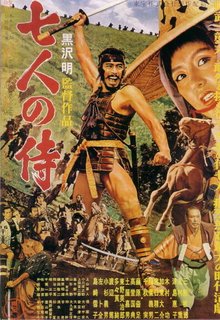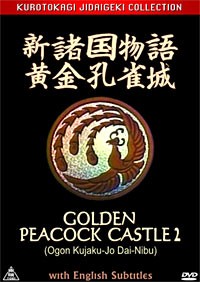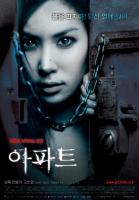 I'm three discs into viewing this massive 8 dvd set of a Chinese television series that derived from Seven Swords, a muddled Tsui Hark directed epic that was released a a couple of years ago. Both are adaptations of a novel written by Liang Yusheng, called Qi Jian Xia Tian Shan. I have not read the book. Based on the little info I can find from other sites, this is a dense novel with lots of characters, relationships, plot twists, etc. that watching the tv series I can see why Seven Swords failed to impress me. It tried to be too faithful to the book, keeping so many details, characters, and subplots that it lost any coherence in the end. The Seven Swordsmen is a lot more entertaining, so far. The first few episodes are exciting, as the new Manchurian government, having gained control of China, is trying to establish their power in the Central Plains, an area of desert and mountains. In doing so an edict was passed outlawing anyone practicing or dealing with the martial arts. This gave the soldiers an excuse to terrorize the countryside, and many were executed. One group has managed to survive, holding two precious items: the children, one of whom is supposedly the rightful heir to the empire, and seeds, representing their hard work, monetary value, and their future hope. Yufang is the daughter of the tribal leader, who is a teacher to the children and is responsible for their and the seeds' safety. Her fiancee, Zhibang, and their best friend, Yuanyin, are two of the tribe who are standouts in their courage and deeds. In an initial encounter with the Manchurian troops, a mysterious man rescues one of the chidren, who somehow wandered out of the village. He is basically the Chinese Gandalf. He helps the Martial tribe and leads Zhibang and Yuanyin to Mount Heaven, to hopefully get the aid of the legendary martial arts masters who live there. They enlist the aid of four men, and are all given magical swords (each with unique abilities) to help them in their cause. They help the Martial tribe escape, first into the mountains, to a secret cave, which they later flee. Subplots abound. The main relationship so far is Zhibang and Yufang, and it isn't going so well. Zhibang is nuts about Yufang. Yufang has only known Zhibang since childhood, and wants to encounter other people (read: men), to enrich her life. The whole marriage is on hiatus unless Yufang comes around. In the course of the following episodes, she has a crush on one of the other swordsmen (who doesn't return her love), and is forced to marry another swordsman so they and the children can cross a checkpoint to safety! As of episode 14 she is an unhappy gal. Zhibang, if he wasn't busy saving her skin, engaged in combat, or helping other people, should be chasing after someone else, 'cause frankly, Yufang ain't worth the wait! Another subplot that wasted a few episodes was one of the swordsman's relationship with a prostitute named Green Pearl, who meet by chance in several places. Both of them finally end up in the clutches of one of the generals. Pointless repetition of her entering and leaving the general's quarters, giving her hero some water while he is chained up and negotiating with the general for her freedom. All the while arguing about true love and decency, whether it exists in this world, and how she doesn't have the capability to love. But she falls for the swordsman, and helps him escape. They dash off together, but she decides to kill herself. What? there is another subplot involving another swordsman, and his meeting a roving band of warriors who are led by a swordswoman clad in red. She's nasty with the whip, and is mean to all men. Of course, they are destined to fall in love. Yeech......
I'm three discs into viewing this massive 8 dvd set of a Chinese television series that derived from Seven Swords, a muddled Tsui Hark directed epic that was released a a couple of years ago. Both are adaptations of a novel written by Liang Yusheng, called Qi Jian Xia Tian Shan. I have not read the book. Based on the little info I can find from other sites, this is a dense novel with lots of characters, relationships, plot twists, etc. that watching the tv series I can see why Seven Swords failed to impress me. It tried to be too faithful to the book, keeping so many details, characters, and subplots that it lost any coherence in the end. The Seven Swordsmen is a lot more entertaining, so far. The first few episodes are exciting, as the new Manchurian government, having gained control of China, is trying to establish their power in the Central Plains, an area of desert and mountains. In doing so an edict was passed outlawing anyone practicing or dealing with the martial arts. This gave the soldiers an excuse to terrorize the countryside, and many were executed. One group has managed to survive, holding two precious items: the children, one of whom is supposedly the rightful heir to the empire, and seeds, representing their hard work, monetary value, and their future hope. Yufang is the daughter of the tribal leader, who is a teacher to the children and is responsible for their and the seeds' safety. Her fiancee, Zhibang, and their best friend, Yuanyin, are two of the tribe who are standouts in their courage and deeds. In an initial encounter with the Manchurian troops, a mysterious man rescues one of the chidren, who somehow wandered out of the village. He is basically the Chinese Gandalf. He helps the Martial tribe and leads Zhibang and Yuanyin to Mount Heaven, to hopefully get the aid of the legendary martial arts masters who live there. They enlist the aid of four men, and are all given magical swords (each with unique abilities) to help them in their cause. They help the Martial tribe escape, first into the mountains, to a secret cave, which they later flee. Subplots abound. The main relationship so far is Zhibang and Yufang, and it isn't going so well. Zhibang is nuts about Yufang. Yufang has only known Zhibang since childhood, and wants to encounter other people (read: men), to enrich her life. The whole marriage is on hiatus unless Yufang comes around. In the course of the following episodes, she has a crush on one of the other swordsmen (who doesn't return her love), and is forced to marry another swordsman so they and the children can cross a checkpoint to safety! As of episode 14 she is an unhappy gal. Zhibang, if he wasn't busy saving her skin, engaged in combat, or helping other people, should be chasing after someone else, 'cause frankly, Yufang ain't worth the wait! Another subplot that wasted a few episodes was one of the swordsman's relationship with a prostitute named Green Pearl, who meet by chance in several places. Both of them finally end up in the clutches of one of the generals. Pointless repetition of her entering and leaving the general's quarters, giving her hero some water while he is chained up and negotiating with the general for her freedom. All the while arguing about true love and decency, whether it exists in this world, and how she doesn't have the capability to love. But she falls for the swordsman, and helps him escape. They dash off together, but she decides to kill herself. What? there is another subplot involving another swordsman, and his meeting a roving band of warriors who are led by a swordswoman clad in red. She's nasty with the whip, and is mean to all men. Of course, they are destined to fall in love. Yeech......Soap opera? Hell yes, which is why this series has been annoying and somewhat addictive to watch. There are good fight scenes, and decent moments of drama and suspense, but overdone at times. I can't stand the slow motion to emphasize drama, nor the quick pan to show off some stylistic camera work. It doesn't work. The acting is fine for what it is. The story is interesting when they don't stray from the main theme, but wallows a lot when it does go into subplot mode. I'll add updates as I watch more -- I only have 25 more episodes to go through.







